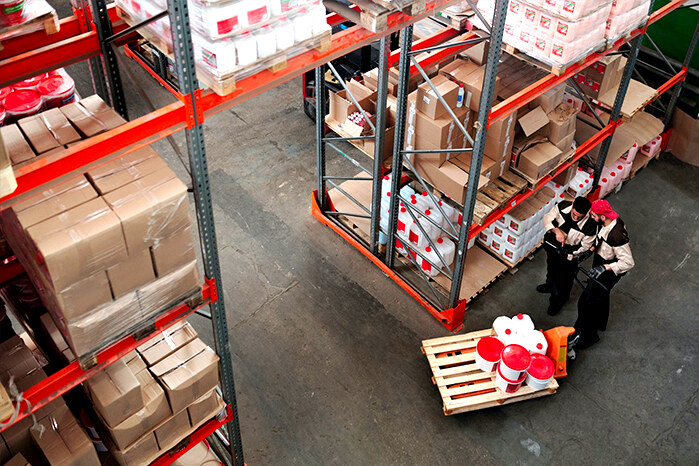11 Wholesale Trends to Watch in 2024

As we head into a new year, store owners need to look to the future to stay on top of the biggest trends forming in the industry.
By analyzing marketplace data and staying current on tech trends, we’ve compiled some great insights on what to expect in the wholesale industry and what you can do to keep your business relevant, agile, and prosperous in 2024.
Read on as we map out 11 important industry trends to help prepare your business for another exceptional year.
Table of Contents
What to Expect in the Global Wholesale Distribution Industry in 2024?
The wholesale industry is on the cusp of significant change which has been driven by technological advancements, evolving consumer preferences, and global economic shifts.
As we bid farewell to 2023, it's important to reflect on the trends that have shaped the wholesale landscape, and forecast trends that will define the industry in 2024.
Overview of the Wholesale Industry in 2023
In 2023, the wholesale sector witnessed a surge in digitalization, with B2B e-commerce becoming the norm rather than the exception. The global wholesale market grew from $45,672.51 billion in 2022 to $48,883.25 billion in 2023.
Internet penetration continues to see growth on a global scale. The adoption of online platforms, especially Alibaba.com, played a pivotal role in connecting wholesalers and buyers across the world. In fact, Alibaba.com experienced a 14% year-over-year increase in revenue.
Additionally, sustainability became a top priority, prompting wholesalers to rethink their sourcing practices and embrace eco-friendly alternatives.
Forecasts for the Wholesale Industry in 2024
As we look ahead to 2024, several of the latest trends are poised to shape the global wholesale distribution landscape. For merchants and business owners looking to sell using Alibaba.com, it is important to stay ahead of the curve. Let's explore how they will impact B2B e-commerce sellers and wholesalers.
11 Wholesale Trends to Watch in 2024
E-Commerce Integration
The convergence of wholesale and e-commerce will continue to gain momentum in 2024. Wholesalers are expected to enhance their online presence, leveraging e-commerce platforms to streamline transactions, expand their reach, and provide a seamless buying experience.

The global e-commerce market can be competitive. Alibaba.com, as a leading B2B e-commerce platform, will be at the forefront of this integration, offering innovative tools and solutions for wholesalers.
Sustainable Sourcing
In 2024, sustainability will remain a critical focus for wholesalers. Buyers are increasingly demanding ethically sourced and environmentally friendly products.
Wholesalers will need to adapt by incorporating sustainable practices into their supply chains, and Alibaba.com will play a pivotal role in connecting environmentally conscious wholesalers with like-minded buyers.
Data-Driven Decision-Making
Information is power.
The power of data will be more evident than ever in the wholesale industry. Wholesalers will harness advanced analytics to gain insights into market trends, consumer behavior, and inventory management.
Alibaba.com's data-driven tools will empower sellers to make informed decisions, optimize pricing strategies, and stay agile in a dynamic market.
Personalized Wholesale Experience
In 2024, personalization will extend beyond the realm of B2C to B2B transactions. Wholesalers will leverage data and technology to tailor their offerings to the unique needs of individual buyers.
Alibaba.com's platform will support this trend by providing customizable storefronts, AI-driven recommendations, and personalized communication channels. Merchants can also create short links to the website for easy access across social channels to their online store.
AI-Powered Supply Chain Management
Artificial intelligence will revolutionize supply chain management in 2024. Wholesalers on Alibaba.com will benefit from AI-driven solutions that enhance inventory forecasting, streamline logistics, and minimize operational inefficiencies.
This technological leap will enable wholesalers to optimize their processes and meet the evolving demands of the market.
Cross-Border Trade
Cross-border trade is set to be a defining trend in the wholesale industry in 2024. With the global marketplace becoming increasingly interconnected, wholesalers are capitalizing on opportunities to expand their reach beyond domestic borders. Alibaba.com, as a leading B2B e-commerce platform, plays a pivotal role in facilitating cross-border trade by connecting wholesalers with buyers worldwide.
Cross-border trade offers numerous advantages, including access to new markets, diversified revenue streams, and the ability to capitalize on regional demand variations. Wholesalers on Alibaba.com can leverage the platform's international reach to establish meaningful partnerships, navigate regulatory complexities, and seamlessly conduct transactions across borders.
As geopolitical boundaries blur, cross-border trade becomes not just a trend but a strategic imperative for wholesalers looking to thrive in the global marketplace.
On-Demand Warehousing
The concept of on-demand warehousing is reshaping the logistics landscape for wholesalers. In 2024, wholesalers are recognizing the need for flexible and scalable warehousing solutions to adapt to fluctuating orders and market dynamics.

Alibaba.com provides a platform where wholesalers can explore on-demand warehousing services, allowing them to optimize inventory management, reduce costs, and improve overall operational efficiency.
On-demand warehousing addresses the challenge of balancing inventory levels without committing to long-term leases or excessive storage costs. Wholesalers can leverage Alibaba.com to connect with on-demand warehousing providers, ensuring that they have the right amount of storage space precisely when and where they need it.
This trend reflects a shift towards more agile and responsive supply chain strategies in the wholesale industry.
ESG Considerations (Environmental, Social, and Governance)
Environmental, social, and governance (ESG) considerations are increasingly influencing decision-making in the wholesale industry. As mentioned, in 2024, wholesalers on Alibaba.com are expected to prioritize sustainability, ethical sourcing, and corporate responsibility.
From reducing carbon footprints to ensuring fair labor practices, ESG considerations are integral to building positive brands, images and fostering long-term relationships with customers.
Alibaba.com recognizes the importance of ESG in the wholesale landscape and empowers sellers to showcase their commitment to environmental sustainability, social responsibility, and robust governance practices.
Digital Payments
Digital payments are becoming the norm in wholesale transactions, revolutionizing the way wholesalers conduct business. Digital commerce hubs need to embrace this trend by offering secure and efficient digital payment solutions.
Wholesalers can benefit from the convenience of digital transactions, reducing the reliance on traditional payment methods and minimizing financial risks.
Digital payments on Alibaba.com provide a streamlined and transparent financial ecosystem for wholesalers. This trend not only enhances the efficiency of transactions but also mitigates the challenges associated with cross-border payments.
As the wholesale industry embraces digital transformation, the adoption of secure and reliable digital payment methods becomes a cornerstone of success for wholesalers operating on global platforms.
Private Labeling
For global wholesale distributors, competition can be fierce. Private labeling is gaining prominence as wholesalers seek to differentiate themselves in a competitive market.
In 2024, wholesalers will leverage platforms to connect with manufacturers, create custom-branded products, and establish a unique identity in the market.
Private labeling allows wholesalers to offer exclusive products, build brand loyalty, and control their value proposition. Alibaba.com's extensive network of suppliers and manufacturers facilitates a seamless private labeling process, enabling wholesalers to bring innovative and customized products to market while maintaining control over quality and branding.
3PL Partnerships
Collaboration with third-party logistics (3PL) providers is a strategic move for all wholesale distributors looking to optimize their supply chain and enhance overall efficiency.
Merchants require platforms that serve as a bridge, connecting wholesalers with a diverse range of 3PL partners. This trend reflects a growing recognition of the value that specialized logistics providers bring to the wholesale industry.
3PL partnerships on Alibaba.com offer wholesalers access to a network of experienced logistics professionals, streamlined distribution channels, and cost-effective solutions for warehousing and transportation.
By outsourcing logistics operations to reliable 3PL partners, wholesalers can focus on their core competencies, reduce operational complexities, and meet the evolving demands of the market.
Bonus Trend: Wholesale Fashion Trends
Wholesale fashion trends in 2024 reflect a dynamic blend of timeless elegance and contemporary flair. Consumers are looking for a special look that is usually associated with boutiques.
Sustainable fashion has certainly taken center stage, with a surge in demand for eco-friendly materials and ethical production practices. Vibrant colors, bold patterns, and innovative textures characterize apparel, catering to diverse consumer tastes.
The influence of technology is evident, with smart fabrics and wearable tech making a mark. Additionally, oversized silhouettes and gender-fluid designs redefine traditional norms.
Wholesalers navigating this exciting landscape must balance classic appeal with forward-thinking sustainability and tech integration to meet the evolving demands of the fashion-forward consumer market.
Wholesale industry trends are constantly evolving. As mentioned, global e-commerce is a high-level competition. The trends listed above provide a snapshot of what is to come in 2024. We’ve provided a forecast of what to expect, but what is important is constant research and analysis.
Now that we have the trends covered, it’s time to delve into how businesses can adapt to the growing marketplace.
How Businesses Can Adapt to Wholesale Trends
As the wholesale landscape undergoes rapid transformations in 2024, businesses must proactively adapt to emerging trends to stay competitive and relevant in the market. Here's a guide on how businesses can navigate these changes and position themselves for success.

Embracing Technology
One of the key drivers of change in the wholesale industry is technological innovation. To thrive in this dynamic environment, businesses must embrace technology across their operations. This includes leveraging advanced e-commerce platforms, such as Alibaba.com, to streamline transactions, enhance visibility, and reach a global audience.
Technology extends beyond transactional processes; it encompasses data analytics, artificial intelligence, and digital marketing. Wholesalers should invest in tools that provide actionable insights into market trends, consumer behavior, and inventory management.
Adopting technology-driven solutions not only improves operational efficiency but also positions businesses to stay ahead of the curve in a rapidly evolving industry.
Developing Sustainable Strategies
Sustainability is no longer a niche concern; it's a fundamental aspect of modern business practices. Wholesalers must develop sustainable strategies that align with environmental, social, and governance (ESG) considerations.
This involves reevaluating supply chains, sourcing practices, and product lifecycle management to minimize environmental impact.
By integrating eco-friendly practices into their operations, wholesalers not only contribute to global sustainability goals but also meet the growing demand for responsibly sourced products in the marketplace.
Recognizing and Adapting to Changes in Consumers’ Needs
Consumer preferences are ever-evolving, and businesses must remain attuned to these changes. Understanding and adapting to shifts in consumer needs is crucial for staying relevant and meeting market demand.
Whether it's the demand for personalized experiences, sustainable products, or seamless online transactions, businesses should be agile in adjusting their strategies.
Embrace Wholesale Trade Industry
If you are reading this article, chances are you already embrace wholesale trade. For those who need more convincing, read below.
The wholesale trade industry involves the sale of goods to businesses, institutions, or other entities, rather than selling directly to individual consumers. In this sector, wholesalers act as intermediaries between manufacturers or producers and retailers.
They purchase goods in large quantities, often at discounted prices, and then sell them in smaller quantities to retailers who, in turn, sell to end consumers.
Wholesale trade covers a wide range of products, including but not limited to consumer goods, industrial supplies, machinery, raw materials, and agricultural products.
This industry plays a crucial role in the supply chain, facilitating the efficient distribution of goods from manufacturers to retailers. Wholesalers often provide services such as bulk purchasing, warehousing, and transportation to streamline the distribution process for both producers and retailers.
On Alibaba.com, businesses can tap into a vast and diverse consumer base, gaining insights into global market trends. The platform's data-driven tools can assist businesses in recognizing emerging patterns, allowing them to adjust their product offerings and marketing strategies accordingly.
FAQs

How can technology enhance my wholesale business?
Embracing technology can revolutionize your wholesale business by streamlining operations, improving efficiency, and expanding your reach. Utilize e-commerce platforms like Alibaba.com, leverage data analytics for informed decision-making, and explore automation tools to stay competitive.
Why is sustainability important for wholesalers?
Sustainability is increasingly becoming a key factor in consumer purchasing decisions. Wholesalers embracing sustainable practices not only contribute to environmental well-being but also appeal to a growing market of environmentally conscious consumers, enhancing their brand reputation.
How can I adapt to changes in consumer needs?
Stay informed about consumer trends by leveraging data analytics tools on platforms like Alibaba.com. Regularly assess market demands, solicit customer feedback, and be flexible in adjusting your product offerings and business strategies to meet evolving consumer needs.
Sell on Alibaba.com
In the midst of these transformative trends, Alibaba.com emerges as a central hub for businesses looking to thrive in the wholesale industry.
With its global reach, advanced technology tools, and commitment to sustainability, Alibaba.com provides a unique opportunity for wholesalers to not only adapt to current trends but also shape the future of their businesses.
Start selling on Alibaba.com Today! Unlock the potential of a global marketplace, leverage cutting-edge technology, stay on top of wholesale distribution trends and connect with a diverse consumer base.
Whether you are a seasoned wholesaler or just starting new companies, Alibaba.com offers the tools and resources you need to succeed in the dynamic world of B2B e-commerce. Embrace the future of wholesale by joining Alibaba.com and positioning your business for success.
Start your borderless business here
Tell us about your business and stay connected.
Keep up with the latest from Alibaba.com?
Subscribe to us, get free e-commerce tips, inspiration, and resources delivered directly to your inbox.















